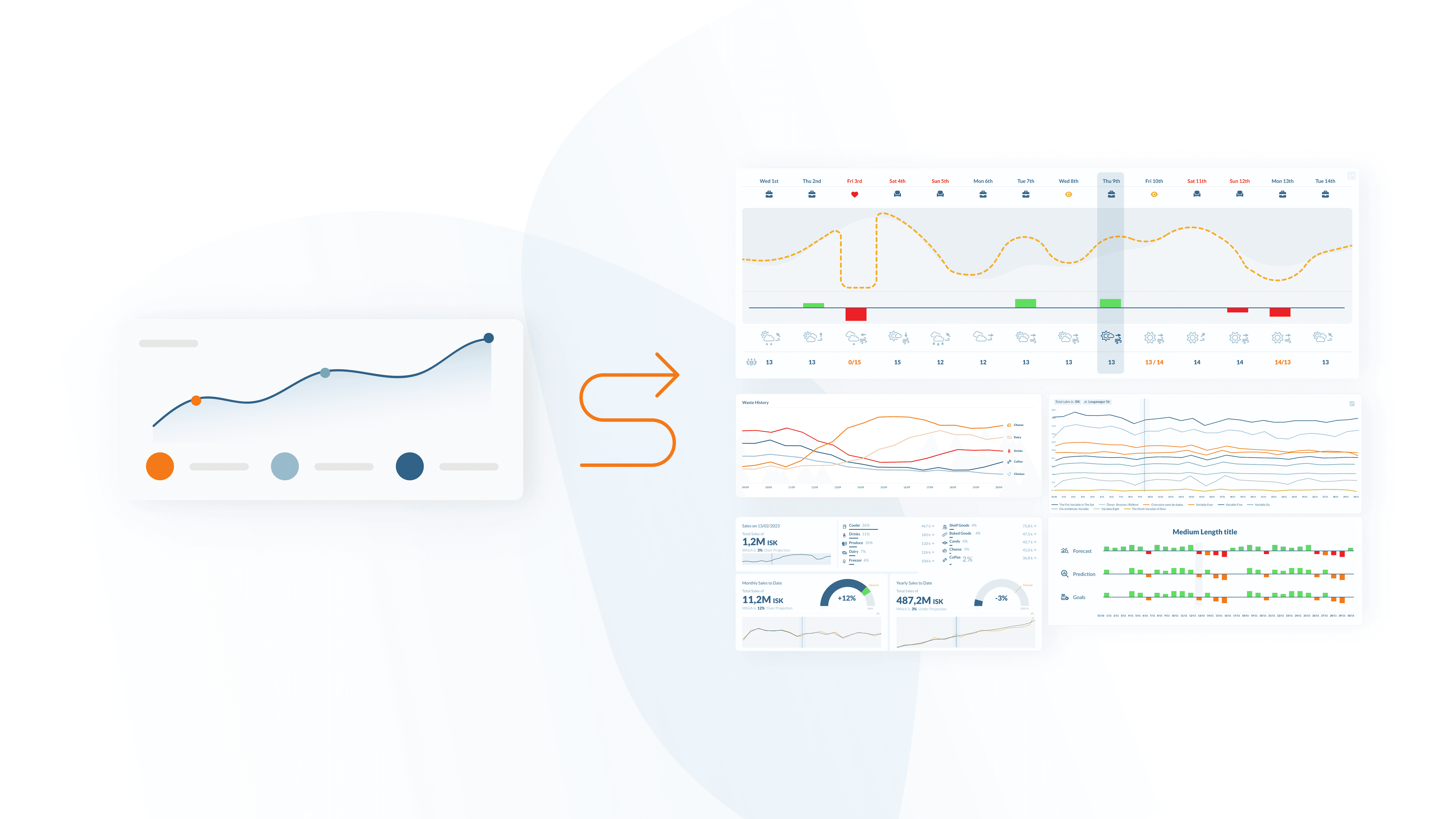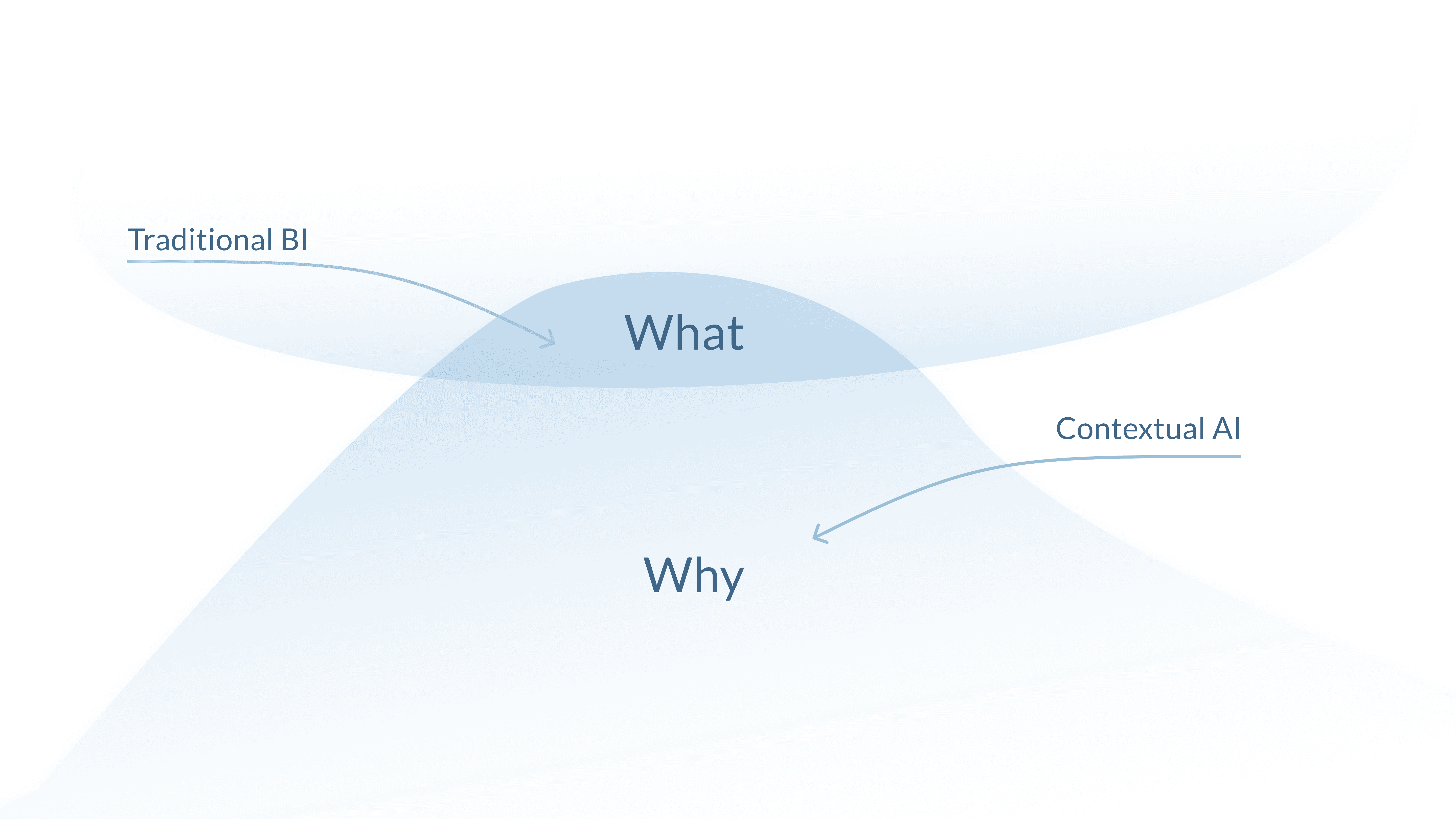

Stefán Baxter
CEO & Founder
Apr 3, 2024
The Evolution of Business Intelligence
From "What" to "Why" with Contextual AI
Introduction
We've covered a wide range of topics, from the intricacies of data maturity to the transformative power of audit trails. Today, let's delve into a seismic shift that's redefining the landscape of Business Intelligence (BI): the evolution from merely understanding "what" and "how much" happened to discern "why" it happened. This is where Contextual AI comes into play, and trust me, it's a game-changer.
The Traditional Scope of BI
Traditionally, BI has been about answering questions like "What are our sales numbers?" or "How much inventory do we have?" While these metrics are undoubtedly important, they only scratch the surface. They tell you what's happening but leave out the crucial context that explains why it's happening.
The Limitations of Conventional BI
Imagine you're a sailor navigating through a storm. Traditional BI would tell you how fast the wind is blowing and how high the waves are, but it won't tell you why the storm occurred or how to navigate through it. You're left with data but need actionable insights.
Enter Contextual AI
This is where Contextual AI comes in. Contextual AI provides the missing layer of "why" to your BI analytics by analyzing a myriad of external factors, from market trends to customer sentiment. It's like having a seasoned sailor on board who not only understands the storm but also knows how to navigate through it.
The Benefits of Contextual BI
Here's what you stand to gain:
Deeper Insights
Understanding the "why" behind the data allows for more nuanced decision-making.Proactive Strategy
Instead of reacting to what happened, you can anticipate and prepare for what's coming.Enhanced ROI
With more contextual insights, your strategies become more targeted, maximizing ROI.Competitive Edge
In a world where everyone can access the same data, understanding the "why" gives you a distinct advantage.
Real-World Applications
Consider a sudden drop in sales. Traditional BI would report the decline. Contextual AI, however, could analyze customer sentiment, market trends, and even geopolitical events to provide a comprehensive understanding of why the drop occurred, enabling you to take informed corrective action.

Conclusion
The evolution from "what" to "why" in Business Intelligence is not just an incremental step; it's a leap. Contextual AI is the catalyst for this transformation, offering a depth of understanding that turns data from mere numbers into actionable insights. In today's complex, ever-changing business environment, that's not just valuable; it's essential.
Introduction
We've covered a wide range of topics, from the intricacies of data maturity to the transformative power of audit trails. Today, let's delve into a seismic shift that's redefining the landscape of Business Intelligence (BI): the evolution from merely understanding "what" and "how much" happened to discern "why" it happened. This is where Contextual AI comes into play, and trust me, it's a game-changer.
The Traditional Scope of BI
Traditionally, BI has been about answering questions like "What are our sales numbers?" or "How much inventory do we have?" While these metrics are undoubtedly important, they only scratch the surface. They tell you what's happening but leave out the crucial context that explains why it's happening.
The Limitations of Conventional BI
Imagine you're a sailor navigating through a storm. Traditional BI would tell you how fast the wind is blowing and how high the waves are, but it won't tell you why the storm occurred or how to navigate through it. You're left with data but need actionable insights.
Enter Contextual AI
This is where Contextual AI comes in. Contextual AI provides the missing layer of "why" to your BI analytics by analyzing a myriad of external factors, from market trends to customer sentiment. It's like having a seasoned sailor on board who not only understands the storm but also knows how to navigate through it.
The Benefits of Contextual BI
Here's what you stand to gain:
Deeper Insights
Understanding the "why" behind the data allows for more nuanced decision-making.Proactive Strategy
Instead of reacting to what happened, you can anticipate and prepare for what's coming.Enhanced ROI
With more contextual insights, your strategies become more targeted, maximizing ROI.Competitive Edge
In a world where everyone can access the same data, understanding the "why" gives you a distinct advantage.
Real-World Applications
Consider a sudden drop in sales. Traditional BI would report the decline. Contextual AI, however, could analyze customer sentiment, market trends, and even geopolitical events to provide a comprehensive understanding of why the drop occurred, enabling you to take informed corrective action.

Conclusion
The evolution from "what" to "why" in Business Intelligence is not just an incremental step; it's a leap. Contextual AI is the catalyst for this transformation, offering a depth of understanding that turns data from mere numbers into actionable insights. In today's complex, ever-changing business environment, that's not just valuable; it's essential.
Introduction
We've covered a wide range of topics, from the intricacies of data maturity to the transformative power of audit trails. Today, let's delve into a seismic shift that's redefining the landscape of Business Intelligence (BI): the evolution from merely understanding "what" and "how much" happened to discern "why" it happened. This is where Contextual AI comes into play, and trust me, it's a game-changer.
The Traditional Scope of BI
Traditionally, BI has been about answering questions like "What are our sales numbers?" or "How much inventory do we have?" While these metrics are undoubtedly important, they only scratch the surface. They tell you what's happening but leave out the crucial context that explains why it's happening.
The Limitations of Conventional BI
Imagine you're a sailor navigating through a storm. Traditional BI would tell you how fast the wind is blowing and how high the waves are, but it won't tell you why the storm occurred or how to navigate through it. You're left with data but need actionable insights.
Enter Contextual AI
This is where Contextual AI comes in. Contextual AI provides the missing layer of "why" to your BI analytics by analyzing a myriad of external factors, from market trends to customer sentiment. It's like having a seasoned sailor on board who not only understands the storm but also knows how to navigate through it.
The Benefits of Contextual BI
Here's what you stand to gain:
Deeper Insights
Understanding the "why" behind the data allows for more nuanced decision-making.Proactive Strategy
Instead of reacting to what happened, you can anticipate and prepare for what's coming.Enhanced ROI
With more contextual insights, your strategies become more targeted, maximizing ROI.Competitive Edge
In a world where everyone can access the same data, understanding the "why" gives you a distinct advantage.
Real-World Applications
Consider a sudden drop in sales. Traditional BI would report the decline. Contextual AI, however, could analyze customer sentiment, market trends, and even geopolitical events to provide a comprehensive understanding of why the drop occurred, enabling you to take informed corrective action.

Conclusion
The evolution from "what" to "why" in Business Intelligence is not just an incremental step; it's a leap. Contextual AI is the catalyst for this transformation, offering a depth of understanding that turns data from mere numbers into actionable insights. In today's complex, ever-changing business environment, that's not just valuable; it's essential.
Introduction
We've covered a wide range of topics, from the intricacies of data maturity to the transformative power of audit trails. Today, let's delve into a seismic shift that's redefining the landscape of Business Intelligence (BI): the evolution from merely understanding "what" and "how much" happened to discern "why" it happened. This is where Contextual AI comes into play, and trust me, it's a game-changer.
The Traditional Scope of BI
Traditionally, BI has been about answering questions like "What are our sales numbers?" or "How much inventory do we have?" While these metrics are undoubtedly important, they only scratch the surface. They tell you what's happening but leave out the crucial context that explains why it's happening.
The Limitations of Conventional BI
Imagine you're a sailor navigating through a storm. Traditional BI would tell you how fast the wind is blowing and how high the waves are, but it won't tell you why the storm occurred or how to navigate through it. You're left with data but need actionable insights.
Enter Contextual AI
This is where Contextual AI comes in. Contextual AI provides the missing layer of "why" to your BI analytics by analyzing a myriad of external factors, from market trends to customer sentiment. It's like having a seasoned sailor on board who not only understands the storm but also knows how to navigate through it.
The Benefits of Contextual BI
Here's what you stand to gain:
Deeper Insights
Understanding the "why" behind the data allows for more nuanced decision-making.Proactive Strategy
Instead of reacting to what happened, you can anticipate and prepare for what's coming.Enhanced ROI
With more contextual insights, your strategies become more targeted, maximizing ROI.Competitive Edge
In a world where everyone can access the same data, understanding the "why" gives you a distinct advantage.
Real-World Applications
Consider a sudden drop in sales. Traditional BI would report the decline. Contextual AI, however, could analyze customer sentiment, market trends, and even geopolitical events to provide a comprehensive understanding of why the drop occurred, enabling you to take informed corrective action.

Conclusion
The evolution from "what" to "why" in Business Intelligence is not just an incremental step; it's a leap. Contextual AI is the catalyst for this transformation, offering a depth of understanding that turns data from mere numbers into actionable insights. In today's complex, ever-changing business environment, that's not just valuable; it's essential.


